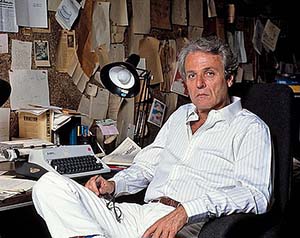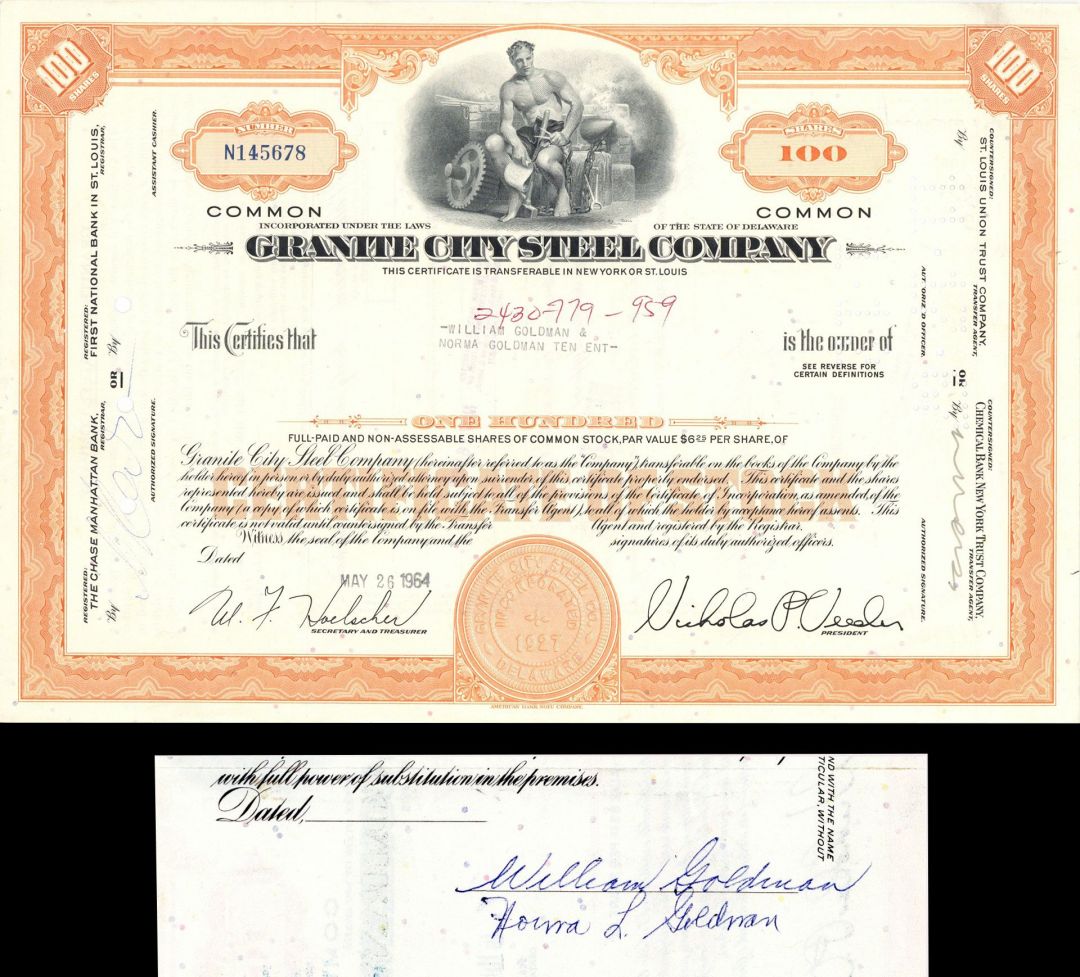Granite City Steel Co. Signed by William Goldman - Stock Certificate
Inv# AG2583 StockMissouri
New York
Stock signed by William Goldman on back.

William Goldman (August 12, 1931 – November 16, 2018) was an American novelist, playwright, and screenwriter. He first came to prominence in the 1950s as a novelist before turning to screenwriting. He won Academy Awards for his screenplays Butch Cassidy and the Sundance Kid (1969) and All the President's Men(1976).
His other well-known works include his thriller novel Marathon Man (1974) and his cult classic comedy/fantasy novel The Princess Bride (1973), both of which he also adapted for film versions. Goldman received a Bachelor of Arts degree from Oberlin College in Ohio in 1952. The Korean War was on, so he was drafted into the Army shortly thereafter. Because he knew how to type, he was assigned as a clerk in the Pentagon, Defense headquarters. He was discharged with the rank of corporal in September 1954. He returned to graduate studies under the GI Bill, earning a Master of Arts degree at Columbia University, graduating in 1956. Throughout this period, he was writing short stories in the evenings, but struggled to have them published.
According to his memoir Adventures in the Screen Trade (1983), Goldman began to write when he took a creative-writing course in college. His grades in the class were "horrible". He was an editor of Oberlin's literary magazine. He submitted his short stories to the magazine anonymously; he recalls that the other editors read his submissions and remarked, "We can't possibly publish this shit." He did not originally intend to become a screenwriter. His main interests were poetry, short stories, and novels. In 1956, he completed a master's thesis at Columbia University on the comedy of manners in America.
His older brother James Goldman was a playwright and screenwriter. They shared an apartment in New York with their friend John Kander. Kander, who also an alumnus of Oberlin, was working on his PhD in music, and the Goldman brothers wrote the libretto for his dissertation. Kander was the composer of more than a dozen musicals, including Cabaret and Chicago, and all three of them eventually won Academy Awards. On June 25, 1956, Goldman began writing his first novel The Temple of Gold, completing it in less than three weeks. He sent the manuscript to agent Joe McCrindle, who agreed to represent him; McCrindle submitted the novel to Knopf, who agreed to publish it if he doubled the length. It sold well enough in paperback to launch Goldman on his career. He wrote his second novel Your Turn to Curtsy, My Turn to Bow (1958) in a little more than a week. It was followed by Soldier in the Rain (1960), based on Goldman's time in the military. It sold well in paperback and was turned into a film, though Goldman had no involvement in the screenplay.
Goldman and his brother received a grant to do some rewriting on the musical Tenderloin (1960). They then collaborated on their own play, Blood, Sweat and Stanley Poole (1961), and on the musical, A Family Affair (1962), written with John Kander. Both plays had short runs.
Goldman began writing Boys and Girls Together, but found that he suffered writer's block. His writer's block continued, but he had an idea for the novel No Way to Treat a Lady (1964) based on the Boston Strangler. He wrote it in two weeks, and it was published under the pseudonym Harry Longbaugh—a variant spelling of the Sundance Kid's real name, which Goldman had been researching since the late 1950s. He then finished Boys and Girls Together, which became a best seller.
After several of his screenplays were not filmed, Goldman found himself in less demand as a screenwriter. He published a memoir about his professional life in Hollywood, Adventures in the Screen Trade (1983), which summed up the entertainment industry in the opening sentence of the book, "Nobody knows anything."
He focused on novels: Control (1982), The Silent Gondoliers (1983), The Color of Light (1984), Heat (1985), and Brothers (1986). The latter, a sequel to Marathon Man, was Goldman's last published novel.
Goldman attributed his return to Hollywood to signing with talent agent Michael Ovitz at Creative Artists Agency. He went to work on Memoirs of an Invisible Man, although he left the project relatively early.
Hollywood's interest in Goldman was reawakened; he wrote the scripts for film versions of Heat (1986) and The Princess Bride (1987). The latter was directed by Rob Reiner for Castle Rock, which hired Goldman to write the screenplay for Rob Reiner's 1990 adaptation of Stephen King's novel Misery, considered "one of [King's] least adaptable novels".[16] The movie, for which Kathy Bates received an Academy Award, performed well with critics and at the box office.
Goldman continued to write nonfiction regularly. He published a collection of sports writing, Wait Till Next Year (1988) and an account of his time as a judge at both the Cannes Film Festival and the Miss America Pageant, Hype and Glory (1990).
Goldman began to work steadily as a "script doctor", doing uncredited work on films including Twins (1988), A Few Good Men (1992), Indecent Proposal (1993), Last Action Hero (1993), Malice (1994), Dolores Claiborne (1995), and Extreme Measures. Most of these movies were by Castle Rock.
He was credited on several other movies: Year of the Comet (1992), which was eventually filmed by Castle Rock, but was not a success; the biopic Chaplin (1992), directed by Richard Attenborough; Maverick (1994), a popular hit; The Chamber (1996), from a novel by John Grisham; The Ghost and the Darkness (1996), an original script based on a true story; Absolute Power (1997) for Clint Eastwood; and The General's Daughter (1999), from the novel by Nelson DeMille.
Goldman wrote another volume of memoirs, Which Lie Did I Tell? (2000), and a collection of his essays, The Big Picture: Who Killed Hollywood? and Other Essays(2001).
His later screenplay credits include Hearts in Atlantis (2001) and Dreamcatcher (2003), both from novels by Stephen King. He adapted Misery into a stage play, which made its debut on Broadway in 2015 in a production starring Bruce Willis and Laurie Metcalf.
His script for Heat was filmed again as Wild Card (2015), starring Jason Statham.
In their feature on Goldman, IGN said, "It's a testament to just how truly great William Goldman is at his best that I actually had to think hard about what to select as his 'Must-See' cinematic work". The site described his script for All the President's Men as a "model of storytelling clarity... and artful manipulation".
Art Kleiner, writing in 1987, said, "William Goldman, a very skilled storyteller, wrote several of the most well-known films of the past 18 years—including Marathon Man, part of All the President's Men, and Butch Cassidy and the Sundance Kid."
Three of Goldman's scripts have been voted into the Writers Guild of America hall-of-fame's 101 Greatest Screenplays list.
In his book evaluating Goldman's work, William Goldman: The Reluctant Storyteller (2014), Sean Egan said Goldman's achievements were made "without ever lunging for the lowest common denominator. Although his body of work has been consumed by millions, he has never let his populism overwhelm a glittering intelligence and penchant for upending expectation."
A stock certificate is issued by businesses, usually companies. A stock is part of the permanent finance of a business. Normally, they are never repaid, and the investor can recover his/her money only by selling to another investor. Most stocks, or also called shares, earn dividends, at the business's discretion, depending on how well it has traded. A stockholder or shareholder is a part-owner of the business that issued the stock certificates.










Ebay ID: labarre_galleries